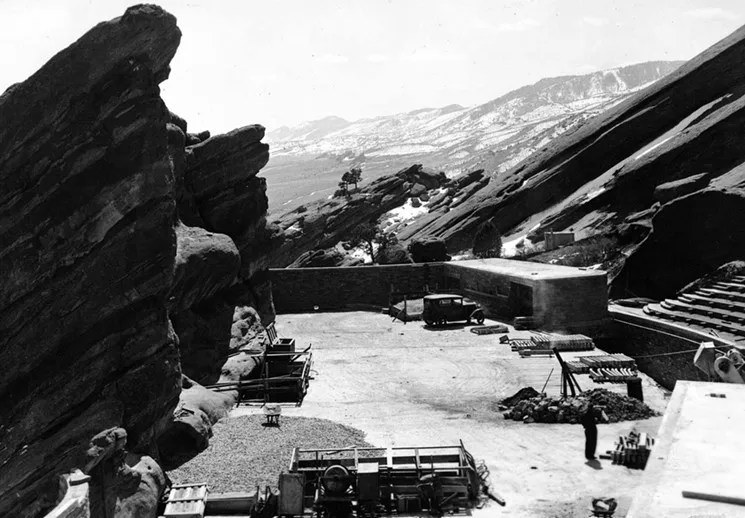
Denver Public Library

Audio By Carbonatix
From 1933 to 1942, the Civilian Conservation Corps gave young men in America a chance to enlist in work programs to improve America’s public lands, forests and parks – at the same time earning a livelihood and sometimes even an education during the Great Depression. They left their mark on the local landscape, particularly with the construction of Red Rocks Amphitheatre.
Democrats in Congress are now are pushing for the federal government to reinstate the Civilian Conservation Corps, this time putting the focus on dealing with the climate crisis and promoting inclusivity.
Colorado is providing a model of what this new CCC could be. Last month, Lieutenant Governor Dianne Primavera unveiled plans for the Colorado Climate Corps, established by the Colorado Youth Corps Association, which currently oversees eight climate-related corps within ServeColorado, the state’s AmeriCorps program. Primavera and Scott Segerstrom, CYCA’s CEO, secured a new AmeriCorps grant to start the Colorado Climate Corps.
“Colorado has received really powerful reminders this summer of the importance of taking bold climate action, because we see the effects of climate change, and it continues to threaten our Colorado way of life and our economy,” Primavera says, citing the wildfires around the state. “The Colorado Climate Corps AmeriCorps program will provide the boots on the ground that we need to make a difference.” That difference will help the state reach its climate goals, such as moving the electric grid to 100 percent renewable energy by 2040, she adds.
Coloradans who join the corps will work full-time, earning a stipend and a Segal Educational Award that can be applied to college tuition or to pay down student debt. Unlike the New Deal’s CCC, this one will not provide room and board, so critical during the Depression. But it will have other important missions.
“The new CCC will allow us to grow our land conservation, our energy and water conservation and our health-care pathways,” explains Brigid McRaith, CEO of Mile High Youth Corps, one of the eight CYCA corps currently working in Colorado on everything from forest thinning to trail restoration. The increased funding will allow the groups to add climate change-specific goals.
For example, the Colorado Climate Corps will introduce a program to help retrofit people’s homes in low-income areas with LED light bulbs, high-efficiency toilets and programmable thermostats. The new corps will partner with marginalized communities on the project, helping them “define their own destiny.” After all, what people on the eastern plains need might be different from what people in northwest Colorado want.
Diversity “is really at the heartbeat of the corps now,” McRaith explains. “Conservation has historically excluded some communities. This new CCC is about diversifying the conservation sector and increasing inclusion and cultural competency. That’s really essential if we’re going to realize the goals of the new CCC.”

U.S. Representative Joe Neguse is pushing for a national CCC.
Courtesy of Sally Tucker
Congressman Joe Neguse has been leading the charge to create a national version of the Colorado Climate Corps.
“It’s another example of the way in which Colorado is really leading the country, and my hope is that Washington, D.C., can follow Colorado’s lead,” Neguse says. He’d introduced a proposal for a national Civilian Conservation Corps in the 2019-2020 legislative session, but it never made it to a vote. Recently, he secured $50 billion in funding for the corps in President Joe Biden’s Building Back Better proposal, which could create up to 130,000 jobs for young people.
The national plan mirrors what Colorado is doing: using existing corps groups as the foundation for a new Civilian Conservation Corps. “Colorado provides a proof of concept,” McRaith explains. “It demonstrates how primed and ready corps are to meet the demand now.”
The two major differences between the national proposal and the Colorado plan are the wages and scale. Neguse’s proposal would pay corps members $15 an hour; they would also work on bigger projects, like the New Deal CCC.
During a September 30 livestream, Senator Ed Markey, a proponent of the bill in the Senate, offered examples of what those bigger projects might look like. The Civilian Conservation Corps could perform the $13 billion in park maintenance that the National Park System has deferred, he suggested, and also perform updates that 53 percent of public schools in the country need.
“From my perspective, I just see any number of ways in which the CCC members will be out there, and they’ll be creating jobs and partnering with different federal agencies, local groups, while reducing greenhouse gases at the same time,” Markey added. “So I just think it’s a win, win, win, win, win all around.”
While the national plan moves through Washington, Colorado is accepting applications for its Colorado Climate Corps, which will start up in January. The AmeriCorps grant opened up 240 additional spots on the existing corps, giving more opportunities to young people seventeen and a half years old and up who care about conservation; they can sign up here.
“All of us, when we’re in this age range, are looking to figure out who we are and what we’re good at,” McRaith says. “It brings them together in service to the broader good, and also really helps them figure out who they are and what they’re good at, and what they want to do moving forward.”